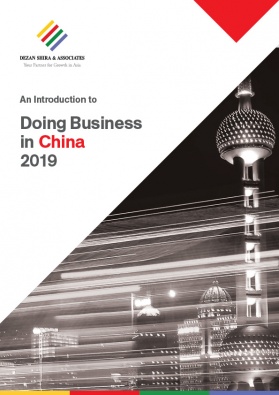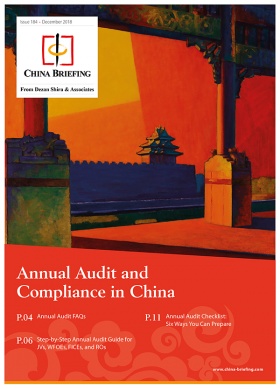Managing Chops and Key Personnel at Your China Business

While delegating power always requires a degree of trust, there are a few measures every foreign investor must consider to successfully mitigate risks that its Chinese business is exposed to.
China Briefing examines how investors can stay in control by intelligently managing access to company seals and the delegation of authority.
In any business, one person delegates power to another to look after their interest. But how to ensure the latter doesn’t abuse this power for his/her own benefit is a classic dilemma known as the agency problem.
It is as pressing an issue in China as in any other country, but Chinese laws and practices deal with this problem differently than most. For the foreign investor, this brings along a number of issues to be aware of.
Managing chops in China
In most countries, individuals can bind the company they are working for if they are authorized by its board to do so. Those actions done with the apparent approval of the board may be seen as the company’s actions.
The decisive factor is what outward appearance the company has created. If someone dealing with the company could reasonably assume an individual was authorized to act on its behalf – based on the appearance set by the company – the company is bound.
The way the rule is phrased shows that the outcome can only be decided on a case-by-case basis. While somewhat vague, this allows room for flexibility and interpretation.
In China, a company is bound whenever a contract or other document is affixed with the company seal or chop.
This is more straightforward in the sense that one can immediately tell whether a company has approved the content of a document or not. What makes it dangerous, however, is that whoever holds the chops can bind the company. On top of that, there is the risk of forged chops.
Companies in China have different kinds of chops for different purposes:
- The company chop contains the company’s full name in Chinese and functions as the official signature of the company. Company chops are used for all basic operations and can cover almost all other chop functions except for that of an invoice or customs chop.
- The finance chop is used for basic company operations, as well as opening a bank account, issuing checks, authenticating financial documents (e.g. tax filings, compliance documents, etc.). It is a compulsory chop.
- The contract chop is used exclusively for signing and authenticating contracts.
- The invoice chop is used for issuing and authenticating official invoices and fapiaos. It is not a compulsory chop and can be replaced by the finance chop.
- The customs chop is used for customs declarations on import/export goods (for companies engaged in cross-border trading).
Note: The company, finance and customs chop are mandatory, while the contract chop can be replaced by the company chop, and the invoice chop by the finance chop.
It is not uncommon for individuals to have their own chop as well. For example, the legal representative can have a personal chop to be affixed along with the company chop.
Such a personal chop can accompany or replace the person’s signature. The company, finance and legal representative chop (if present) need to be recorded with the Public Security Bureau, the Administration of Industry and Commerce (AIC), and with the local bank.
Allocating authority in the company
Legal representative
While it is always wise to carefully consider how much power to delegate to different staff members, there are several uniquely Chinese considerations.
One of these is the position of legal representative. Along with the person holding the company chop, the legal representative has full power to bind the company. The legal representative must be the chairman of the board, executive director or general manager of the company.
The legal representative is appointed when the company is created, and his or her name is registered in the articles of association, with the AIC and on the company business license.
Changing the legal representative is a tedious and lengthy process, which requires changes of the articles of association and amending the business license. In the meantime, the legal representative could still legally bind the company.
A recent court case determined that the company’s internal resolution appointing a new legal representative takes precedence over the name registered with the AIC, so any unauthorized acts by the exiting legal representative can be reversed.
However, reversing unauthorized acts of the legal representative would likely require intervention by the court system. If you are faced with a legal representative gone rogue, most of the damage will have already been done by the time the court has pronounced its ruling.
The legal representative is regarded as being fully responsible for the acts of the company, even if he or she did not authorize or approve of them. In theory, they can be held personally liable for the debts of the company.
There have been instances where a foreign legal representative has been detained or otherwise prevented from leaving China, because the company was involved in a commercial dispute or was in arrears with a tax payment.
For these reasons, it is advisable not to involve legal representative too much in the daily operations of the company. While technically possible, it is not advisable to have the general manager also be the legal representative.
Foreign investors may consider appointing a legal representative that does not reside in China, whose signature is only required two or three times a year, for example the chairman of the board.
General manager
The general manager is in charge of day-to-day operations. They can at the same time be a director of the company, but this is not necessary. It is a powerful position in the company, and foreign investors should take care to appoint a trustworthy individual.
Sadly, it is not uncommon in China for a general manager to commit fraud, engage in self-dealing or misappropriate company funds. There are several ways foreign investors can protect themselves against misconduct by the general manager.
Don’t give the general manager unrestricted access to the company’s chops.
Set rules for the use of chops, such as requiring major decisions to also bear the chop or signature of the director, supervisor or legal representative.
Investors can also hire a third party to act as custodian of the company chops and seals.
Limit the powers of the general manager in the articles of association. This could include capping the amount of money a general manager is allowed to deal with.
Investors may also set a fixed term for the position, such as one year. At the end of the year the board needs to renew his or her term. Due to China’s protective labor law, firing an employee can be rather difficult.
Companies often try to let go of employees by mutual agreement, because dismissing an employee unilaterally can be very difficult and expensive.
It is not unheard of that a foreign company wants to dismiss a local general manager for misconduct, only to find itself blackmailed into an astronomical severance payment because the general manager is in control of the company chops and other essential documents.
Lastly, foreign investors may decide to engage an external party to perform an internal audit on the Chinese subsidiary.
About Us
China Briefing is produced by Dezan Shira & Associates. The firm assists foreign investors throughout Asia from offices across the world, including in Dalian, Beijing, Shanghai, Guangzhou, Shenzhen, and Hong Kong. Readers may write china@dezshira.com for more support on doing business in China.
- Previous Article China Releases Draft Foreign Investment Law, Signaling Major Overhaul for Foreign Investment
- Next Article Wage Comparisons and Trade Flows Between China, ASEAN and India










